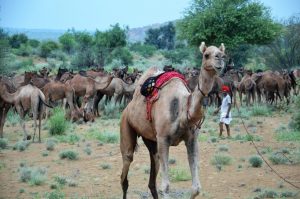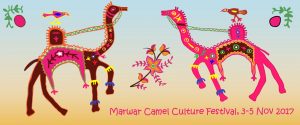Camel breeders in Rajasthan are deeply concerned about recent media reports stating that Amul plans to launch ‘deodorized’ camel milk, as they feel it discredits what they regard as a prime heritage health food.
“Camel milk has no smell when it is freshly milked. It tastes great and is extremely healthy”, says Goparam Raika of Jojawar who is around 70 and has been herding camels his whole life. “Those people who drink camel milk are protected from TB, sugar and cancer”, he states before leading his herd into the Kumbhalgarh Forest. “Camels eat so many trees with medicinal value, including babul, bordi, neem and many others. Why would anybody want to change it?”
“If camel milk has a bad smell, it means it is off and not fit for human consumption” emphasizes Hanwant Singh Rathore, director of Lokhit Pashu-Palak Sansthan, a non-profit that has been working with Raika and other camel nomads since 1996. “It starts smelling when you keep it in unhygienic vessels at high temperatures, like any kind of milk will do. “
“When British celebrity Joanna Lumley visited our organization last year while shooting a documentary about India, she declared the camel milk ‘exquisite’”, he adds.
International camel experts too express disbelief about the Amul move, noting that deodorization is unheard of in other parts of the world. “A healthy camel will provide delicious milk that tastes almost indistinguishable from cow milk. Any suggestion that safe, clean camel milk normally has an inherent odor or bad taste is incorrect”, states Christina Adams from the US.
India has been a late entrant to marketing camel milk which is globally hailed as a superfood because of its health-enhancing values. The Food Safety and Standard Authority of India (FSSAI) determined the standards of camel milk only in December 2016. While government dairy cooperatives have been slow to respond, entrepreneurs, including from the Raika community, have started several initiatives
The Kumbhalgarh Camel Dairy, operated by a social enterprise on the campus of Lokhit Pashu-Palak Sansthan, is a state of the art facility where local camel breeders deliver their milk and which pasteurizes, bottles and freezes the milk before dispatching it in thermocol boxes with ice to consumers all over India.
“Although Rs 5 crore were allotted for setting up camel milk marketing in Rajasthan and the C.M. has actively supported us, nothing has happened. Even though we have had numerous meetings with executives and secretaries”, says Bhom Singh of the Jaisalmer Camel Breeders Association. Sheitan Raika from Bhilwara laments “The camel is Rajasthan’s state animal and we need to have a good market for camel milk, otherwise we cannot afford to keep it. We are grateful that the Prime Minister champions camel milk, but we have received no support from the government in our endeavours to sell camel milk. Stating that it has a bad smell does not help and is plain wrong.”




